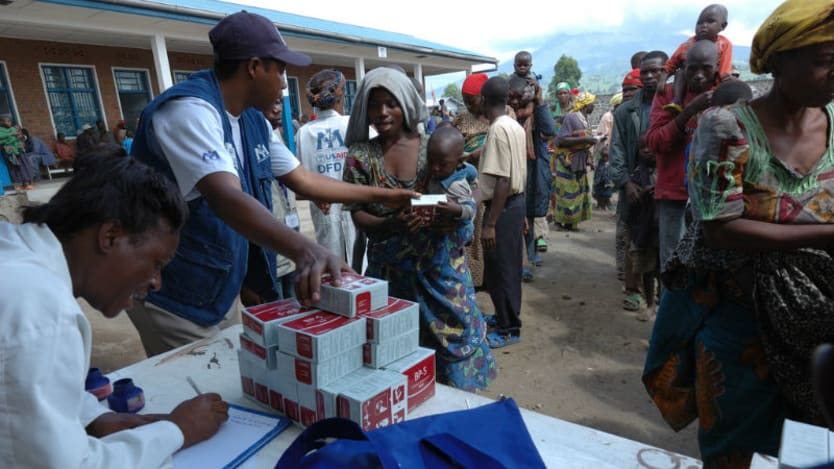
Let’s face it: The international humanitarian and development sector has been severely wounded this past year and has remained in crisis mode ever since.
A steady drip of scandals ranging from Oxfam in Haiti to Save the Children guaranteed a reckoning in the sector that was both necessary and welcomed, particularly by those who have borne the brunt and suffered the consequences of the headquarter-focused international development model for decades.
As the #MeToo gave birth to the #AidToo movement, the international development community was forced to look inward and to reflect on how these incidences of exploitation actually took place. What was the impact of international interventions in the developing nations in which they worked? And true to form, the sector began to quickly develop solutions — and even more true to form — the sector sought to put a Band-Aid on a gunshot wound.
While listening to discussions in an online development conference recently, an interview with a senior international development aid worker stood out. This aid worker lamented the delusional self-grandeur that has permeated the development sector over the years.
We assume we can fix everything with money, with smart, competent people from mostly developed countries, with our log frames, metrics, strategic plans, and our advocacy strategies. We alone can fix it.
It is dizzying how the development sector has careened from one theory of change to another, all the while leaving a trail of buzzwords, jargon, and concepts for developing countries to decipher, integrate, and show how it has impacted their lives.
Remember when microfinance was going to save development? What about capacity building? How about locally led development? Last but not least — and my personal favorite — empowering women and girls. All of these resources at the fingertips and yet ...
No actual plan for the sexual misconduct, mistreatment, and bad behavior of staff — and certainly no plan on how to prevent it in the future.
No analysis of the power differential that has been and remains at the core of the country work where development organizations operate.
No consideration about how the international system itself was based on exclusion, racism, and the white savior complex.
No concrete commitments to making diversity and inclusion a core component of international organizational and development culture.
And without missing a beat, safeguarding joined the aid sector lexicon.
In 2018, the development community began to advance standards for safeguarding as a way to protect staff and aid recipients from sexual harassment, assault, and misconduct perpetrated by international aid organizations.
In March of this year, in response to #AidToo, the United Kingdom’s Department for International Development held a Safeguarding Summit led by Secretary of State for International Development Penny Mordaunt. She said U.K. organizations would increase resources and she would be initiating “new, enhanced, and specific safeguarding standards” for the organizations it funds, which will “set the bar at a level of the very best.”
Could a global register of aid workers prevent sexual abuse?
The U.K. government has proposed a global register of aid workers as a way of bolstering safeguarding in the sector — but how would it work in practice?
These standards will include an assessment of codes of conduct, how organizations identify and respond to incidents, and how their risk management places safeguarding and beneficiaries at the very core.
How many (if any) local organizations working with aid recipients were invited to participate in this summit? How many of the organizations in attendance were able to include staff from the local or national country offices in this summit? As the safeguarding standards were being advanced — how many of those recommendations for standards were analyzed, discussed, or developed by people who lived and worked in any of the countries where abuses have already occurred? Was there input about the efficacy of reporting standards in the cultural context?
While the efforts put forth by DFID are important, there is the reality of who wields the real power, which has distorted how international organizations operate. Ignoring these realities while checking the boxes that require more stringent reporting and development of standards demonstrates the reluctance of the aid sector to pay more than lip service. And if the sector is serious about reform, then there must be a commitment to dig deeper and consider how to initiate and cultivate a “culture of care” for local/national staff and aid recipients in country offices that is first and foremost about protecting people before these incidents occur.
A culture of care requires international organizations to open a space for voices that goes beyond the scope of the current country mission. A culture of care puts the development of protection standards into the hands of those who do not hold the power.
It is simply not enough for aid organizations to hire a director of safeguarding or a head of protection to prevent sexual misconduct. That is a fig leaf as it shields the organization from having to do the difficult work of deconstructing then dismantling the core structures of racism and sexism inherent in aid delivery systems.
This past July, the International Development Committee of the U.K. Parliament published its report on sexual exploitation and abuse in the aid sector. Within that report it states: “The international aid sector’s response to tackling SEA since 2002 has been reactive, patchy and sluggish. The UN has failed to display sustained leadership. DFID’s historical response to reports of SEA has been disappointing. NGOs have created new policies and procedures but have not successfully implemented them, and where worthwhile initiatives have been developed, these have been continually underfunded. Whilst there are clearly actors within the aid community who are dedicated to tackling SEA, the overall impression is one of complacency, verging on complicity.”
Before any reporting system can be improved, aid workers in developing nations and recipients of aid must trust the system that was created and believe that it will operate in their best interest. But why would you trust a system that was developed for you without you?








